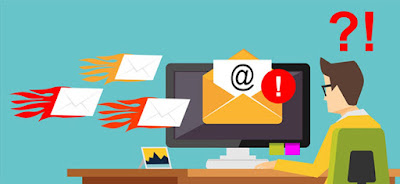WHAT IS EMAIL BOMBARDMENT?


DIGITAL PRIVACY WITH ANTIVIRUS
What
is digital privacy or internet privacy?
In general terms, the definition of digital privacy is
understood as the control that an internet user can exercise over their data,
limiting the access of other people or institutions to their private
information.
Meaning
and concept
The meaning of digital privacy has evolved over time. The
requirements regarding security and protection of private data have been
increasing with the development of the internet and the digital age. Added to
this are the new requirements introduced by the RGPD applicable throughout the
European Union.
The Internet privacy has always been a controversial topic.
Many users are unaware of their rights over their data, or who is accessing
their personal information. On the other hand, some companies need lawyers who
can advise them on compliance with the regulations to manage their digital
privacy.
The new General Regulation for Data Protection places
special emphasis on the regulation of the digital environment. The aim of this
new law is to harmonize all European regulations on digital privacy on the
Internet.
Actions
to protect your privacy on the internet
Digital privacy is something we all need to think about
when surfing the internet. But, how to protect privacy on the internet? Here we
give you the best recommendations so that your data is safe when browsing web
pages and social networks or when using email or mobile applications.
Spend
some time setting up privacy
All social networks offer options for privacy settings.
Take some time to discover these possibilities and update
your account. You can limit access to your profile or your publications, as
well as block users or manage the receipt of announcements and notifications.
Update
antivirus and firewall
Another action to protect privacy on the Internet is to
keep antivirus
updated to the latest version. Cybercriminals innovate their systems for
hacking and infecting computers, so you need the right tools to fight malware.
Use
password encryption systems
It is a very effective system to protect digital privacy.
Allows you to hide passwords using encryption algorithms. In addition, the user
can access all their accounts (with different passwords) through the same
master password. An example would be Last Pass.
Facebook
Facebook is the social network with the most users in the
world. It has been embroiled in some massive data breach scandals that have
affected millions of people. Despite this, most people continue to use it
without worrying about the security of their data.
How do you know how Facebook uses your data? You can find
out by entering these links:
· Privacy
Policy
· Cookies
policy:
· Conditions
of service:
The user can configure privacy on Facebook through their
personal profile. What management options are there?
Decide who accesses your current and old profile or posts
· Create
custom friend lists
· Manage
locks
· Set
the conditions for friend suggestions
· Change
the privacy of photos
· Define
the use of tags
· Limit
access to app information
· Change
parameters for ads
Use advance antivirus software that
protects all your social media activity without letting your data leak.
Instagram
Instagram is a social media platform where the main
protagonists are the photographs. It was acquired by Facebook in 2012. Like all
companies, it is obliged to comply with the new privacy and data protection
laws.
The Instagram Privacy and Security Center establishes the
data policies of the social network. It also informs about the options that the
user has to configure privacy on Instagram (left column).
Since Instagram is a social network that is based on
sharing photos, we also recommend that you consult our guide on privacy rights
of images.
Twitter
The privacy settings on Twitter allow the user to control
their personal data. What can be done to protect private information on
Twitter?
· Put
the profile public or private
· Change
username, password, email or phone number
· Decide
the privacy and location of tweets
· Manage
contacts
· Allow
other tweeters to find you (or not) through your email
· Modify
the visibility of photos
· Decide
how Twitter collects content and collects data
· Enable
or disable direct messages
· Block
users
· Mute
users or words
· Manage
notifications
Applications
The development of the internet and the digital environment
has favored the appearance of applications for mobile devices. Nowadays there
are apps of all kinds: instant messaging services like WhatsApp or Telegram,
management tools or even platforms to meet people like Tinder or Happen. But
what are the digital privacy policies of the most popular applications?
WhatsApp
By default, privacy on WhatsApp allows other users:
· View
contact status updates
· View
read receipts
· See
updates on profile information or photo
· View
last connection time
Telegram
Telegram is an application that collects various data about
users:
· Basic
account information
· Email
· Phone
number
· Sent
messages
· Created
multimedia files
· Cookies
(in order to improve the service)
In its privacy policy, Telegram advises that this data may
be shared with other users of the app, with companies of the same group or with
the State security forces and bodies.
To configure privacy in Telegram you must go to
Settings> Privacy and Security. From this option you can decide who can see
your latest publications, or if you want your messages and multimedia files to
self-destruct after a certain time.
These parameters can be changed in the menu of the mobile
device. How to change the privacy settings on WhatsApp?
Android: Menu> Settings> Account> Privacy
iOS: Settings> Account> Privacy
So, using all these and with the help of an antivirus which is updated and comes with all facilities are going to protect your data which is their on social media and will protect your digital identity.
Comments
Post a Comment